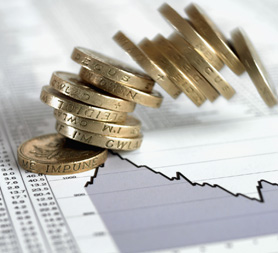Pressure on mortgages as inflation rises
As inflation rises to 4 per cent, Economics Editor Faisal Islam says an interest rate increase is likely in the next four or five months.

A rise would mean higher mortgage costs for millions of people who are not on fixed rate deals, as well as increased borrowing costs for businesses.
As expected, the Government’s preferred measure of inflation – the consumer prices index (CPI) – rose from 3.7 to 4 per cent last month.
The increase has been attributed to a rise in the cost of oil and the decision to raise VAT from 17.5 to 20 per cent.
Letter to Chancellor
The CPI is double the Government’s 2 per cent target. As inflation has been more than 1 per cent above target for three months, the Bank of England Governor Mervyn King has written a letter of explanation to Chancellor George Osborne, with an apparent hint that interest rate rises could lie ahead.
He says in his letter: “There is a great deal of uncertainty about the medium-term outlook for inflation. And I do not wish to conceal there are real differences of view within the committee, reflecting different judgements about the risks to that outlook.
“Inflation is likely to continue to pick up to somewhere between 4 per cent and 5 per cent over the next few months ahead. Inflation is likely to remain above target for this year, before falling back in 2012.”
Mr Osborne has also sent Mr King a letter, saying that without the Government’s deficit reduction programme, the MPC’s task of controlling inflation would be made harder.
When it next meets, the MPC will have to balance inflation with the latest output figures for the economy.
The issue for the MPC is that whatever the exceptional factors beyond the Bank of England's control, the inflation felt in households across the country is very real, writes Faisal Islam.
The Bank will not want to push this beyond the point that the inflation target loses its vital role as an anchor for inflationary expectations. It is a vicious dilemma. I expect them to make an exploratory "toe-in-the-water" rate rise in the next four or five months. Read more
Although Britain is no longer in recession, Gross Domestic Product (GDP) unexpectedly declined by 0.5 per cent in the final quarter of 2010. If there is another contraction, the country would find itself back in recession.
The latest inflation figures are slightly below expectations. Economists had predicted a CPI rate of 4.1 per cent.
The Retail Prices Index (RPI) measure of inflation, which includes housing costs, rose from 4.8 to 5.1 per cent from December to January.
The Bank will publish its quarterly inflation report tomorrow. This will give the City some idea if inflation is expected to start to fall to its 2 per cent target, or whether a base rate rise is likely.
Amit Kara, UK economist at UBS, said: “The issue for the monetary policy committee is that inflation has overshot its target for much of the last five years and many are doubting its commitment to the inflation target.”
Labour’s Shadow Chancellor, Ed Balls, told Channel 4 News that Britain now faced “the worst of all worlds”.
“An economy which has slowed down, where unemployment is rising, people’s living standards being hit really hard this year – and yet at the same time the VAT rise has pushed up inflation, with many people now saying that interest rates will have to rise for mortgages too. I think the Chancellor is making life very difficult for the Bank of England.”
George Osborne said: “What the British Government can do is support them (the Bank) and their decision by bearing down on the budget deficit…and by doing that we create the space – we allow the Bank of England to keep interest rates lower for longer than would otherwise be the case.”
The CBI Director General, John Cridland, told Channel 4 News that the country had moved into “unprecedented times”.
“We have a Bank that has to look at two very different objectives: preventing inflation creeping back into the British psyche, but also keeping the economy going when interest rates are virtually nominal,” he added.
“In these circumstances, I think they need a little bit of slack, but they have to keep their eye on the long-term ball.”
Productivity
British workers are less productive than many of their competitors in leading industrialised countries. But productivity increased faster in the UK from 1991 to 2007.
Latest figures from the Office for National Statistics (ONS) show that in 2009, output per worker in the UK was higher than Japan, similar to Germany and Canada, but lower than France, Italy and the US.
Gross domestic product (GDP) per worker was lower than the average of G7 countries excluding the UK.
From 1991-2007, GDP per worker increased by 40 percentage points in the UK, faster than any other G7 country. But productivity fell from 2007-09 by 6 percentage points. There were similiar falls in Germany, Italy and Japan.
The US was the only G7 country to see an increase in GDP per worker over the past two years.
From 1991-2009, UK GDP per worker grew by 34 percentage points, compared with 36 percentage points in the US, and 27 percentage points for the G7 excluding the UK.